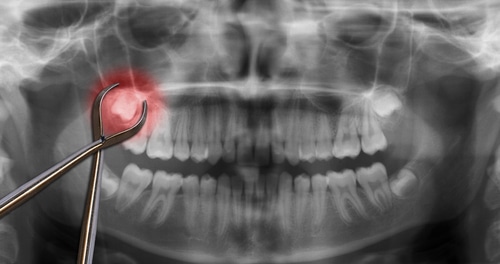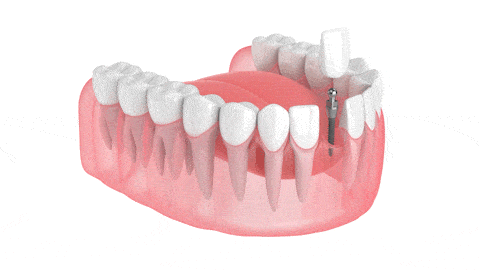Tooth Extraction in Austin, TX
Decay and gum disease are the most common causes of tooth extraction in adults. When dental problems are not resolved through other means, we can perform a tooth extraction to support and maintain your oral health. At Aspire Dental, we recognize that our patients value convenience, quality, and comfort. That’s why we offer skilled in-office extractions with various sedation options to help ease your worry.
Why Is Tooth Extraction Needed?
Whenever possible, our goal is to preserve the health of your natural teeth. However, sometimes a tooth needs to be extracted. If the tooth cannot be saved with other treatments, we’ll remove it before it can damage healthy teeth, bone, or tissues in your mouth.
Teeth may need to be extracted for various reasons:
- Tooth Decay: Severe decay can damage a tooth beyond repair. Although dental crowns can restore functionality in many cases, teeth that are badly damaged may need to be removed.
- Gum Disease: While gum disease treatment aims to restore health to your gums, advanced periodontal disease can lead to tooth mobility and bone loss, requiring extraction.
- Infection: An infected tooth that cannot be saved with root canal treatment can be extracted to prevent the spread of infection.
- Trauma: Teeth damaged due to accidents or injuries, with extensive fractures or root damage, may need removal.
- Impaction: Impacted teeth cannot erupt from the gums properly due to crowding or the tooth’s position. To alleviate pain and prevent harm to neighboring teeth, we will remove the tooth.
- Overcrowding: Some orthodontic treatment plans require tooth extractions to create space for proper alignment.
- Supernumerary teeth: Hyperdontia refers to the development of extra teeth in the mouth. These extra teeth may disrupt your bite or alignment, leading to extraction.
- Wisdom teeth issues: When wisdom teeth are impacted or likely to cause future problems, they must be removed to maintain your oral health.

Certain circumstances, like decay or gum disease, can be managed and controlled before extraction is necessary. Other cases, such as impacted wisdom teeth, can’t be prevented. No matter the reason, we will help you restore your oral health and regain your well-being.
Types of Tooth Extractions
Patients often wonder what the tooth extraction process is like. Each individual’s case is a little different, but the variations largely depend on which type of extraction is needed: simple or surgical.
Simple
Simple tooth extractions remove teeth that are visible in the mouth and easily accessible. We typically perform these extractions under local anesthesia, ensuring your comfort throughout the procedure. Using specialized instruments, such as an elevator and forceps, we gently loosen and lift the tooth from its socket.
After removing the tooth, we place a gauze pad in the socket to control bleeding. We’ll also provide thorough post-operative care instructions to facilitate healing. Recovery from a simple extraction is usually straightforward, with mild discomfort and swelling that typically subsides within a few days.
Surgical
In contrast to simple tooth removal, surgical tooth extractions are more complex and involve teeth that are not easily accessible, often because they have not fully erupted, are impacted, or have complex root structures. A surgical extraction requires an incision in the gum tissue to access the tooth. In some cases, we may need to remove bone or section the tooth into smaller pieces for easier removal.
Once the tooth is extracted, we’ll place stitches to close the incision and control bleeding. These more complicated extractions often incorporate deeper levels of sedation—such as oral sedation or laughing gas—to ensure your comfort during the procedure. Dr. Hall is board-certified in nitrous oxide sedation to help make his patients relaxed and at ease.
Because of their more invasive nature, surgical extractions tend to have a longer recovery period and may require more post-operative care than simple extractions.
How Long Does a Tooth Extraction Take?
A common question our patients ask is how long the extraction process takes. The length of the procedure depends on a few factors:
- The type of extraction: simple or surgical
- The type of anesthesia chosen
- The condition of the tooth needing extraction
- The location of the tooth in the mouth
- The number of teeth being removed
- Whether additional procedures are needed, such as implant placement or bone grafting
We’ll let you know ahead of time how long you can expect your procedure to last so that you can make the necessary arrangements.
Replace a Missing Tooth with a Mini Implant
When you lose a tooth, your jaw begins to weaken in that area. Ordinarily, the tooth’s roots stimulate the jawbone, which maintains its health. When we pull the tooth, the jawbone no longer receives this needed stimulation, triggering bone resorption. Bone loss has adverse consequences: it can alter your bite, make chewing and speaking more difficult, and change your facial appearance, among others.
 We recommend replacing the missing tooth with a dental implant. Unlike other tooth replacement options, like traditional dental bridges or dentures, dental implants are artificial tooth roots that stimulate and preserve the jawbone. At Aspire Dental, we specialize in mini dental implant placement. These skinnier versions of traditional dental implants allow us to replace your tooth on the same day as your extraction.
We recommend replacing the missing tooth with a dental implant. Unlike other tooth replacement options, like traditional dental bridges or dentures, dental implants are artificial tooth roots that stimulate and preserve the jawbone. At Aspire Dental, we specialize in mini dental implant placement. These skinnier versions of traditional dental implants allow us to replace your tooth on the same day as your extraction.
Generally, we try to place the implant after the extraction and mount a restoration, like an artificial crown, during the same visit. This allows you to leave the office with a complete and functional smile. However, each person is different. Some patients need bone grafting to rebuild the jawbone before we can place a mini implant. Fortunately, mini implants take up significantly less space than conventional implants, making them an excellent choice for individuals who have already lost volume in their jawbones.
Mini dental implants are a superior tooth replacement solution. They offer immediate results, last for years, preserve the jawbone, and are more cost effective than traditional implants. If you need a tooth extracted, we highly recommend replacing the tooth promptly with a mini implant.
Tooth Extraction Aftercare
After your tooth is removed, caring for the extraction area is crucial for healing properly and preventing a painful condition called a dry socket. Biting on a gauze pad helps a blood clot form at the extraction site, beginning the healing process. While we will discuss specific post-op instructions with you, some general guidelines for the first few days after extraction include the following:
- Use an ice pack and prop yourself up as you rest to reduce swelling.
- To manage pain, take any prescribed medications exactly as directed. Over-the-counter pain relievers can also help control discomfort.
- Don’t use a straw since the suction can dislodge the blood clot.
- Eat soft, lukewarm foods and cool drinks after your extraction. Foods like soup, pudding, applesauce, eggs, and mashed potatoes are good choices as you recover.
- Resist drinking soda and other carbonated beverages, which can irritate the extraction site.
- Avoid strenuous activity, as the increased blood flow can slow healing.
- Don’t smoke since doing so can cause complications that delay healing.
While recovery time depends on several factors, you can expect to feel better in a few days as the gum heals. Many people can return to work or school within a day or two, depending on the nature of their extraction and their occupation. In about 7-10 days, most patients will notice that the opening in their gums has closed.
Choose Aspire Dental for Expert Tooth Extractions
When you remove and replace a tooth at Aspire Dental with Dr. Hall and Dr. McNeil, you receive expert care from experienced dentists who prioritize your comfort and well-being. Their skillful approach, state-of-the-art equipment, and sedation options guarantee a smooth and efficient extraction. You can trust Aspire Dental for comprehensive pre- and post-operative guidance, ensuring a seamless experience and a swift return to optimal oral health.
If you or someone you love needs a tooth extracted, contact us today to learn more.
